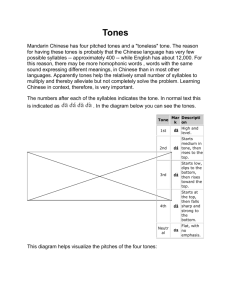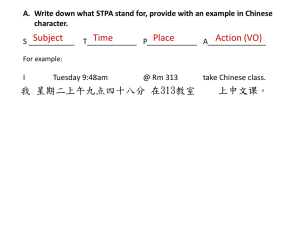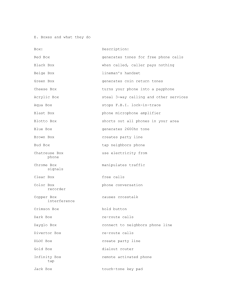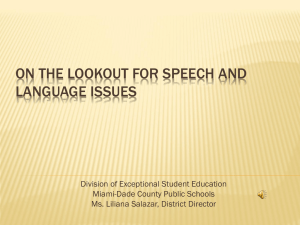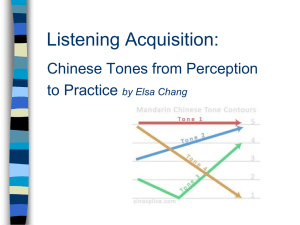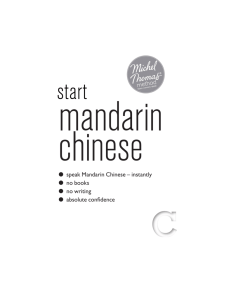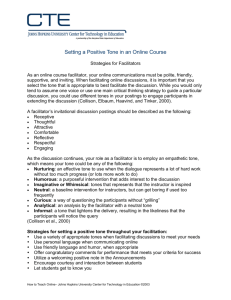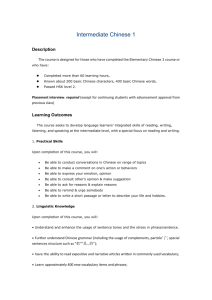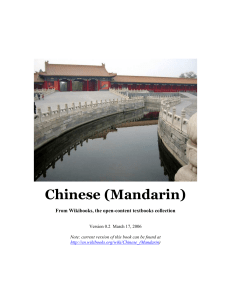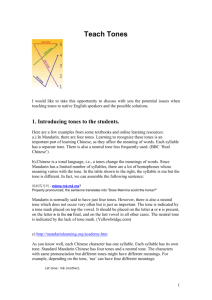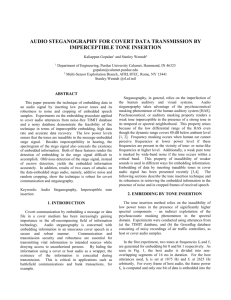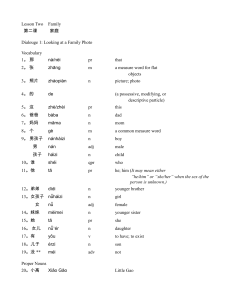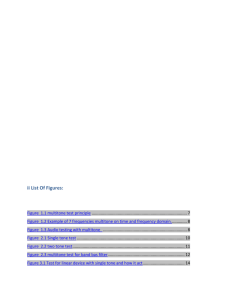Drills for Chinese Tones
advertisement
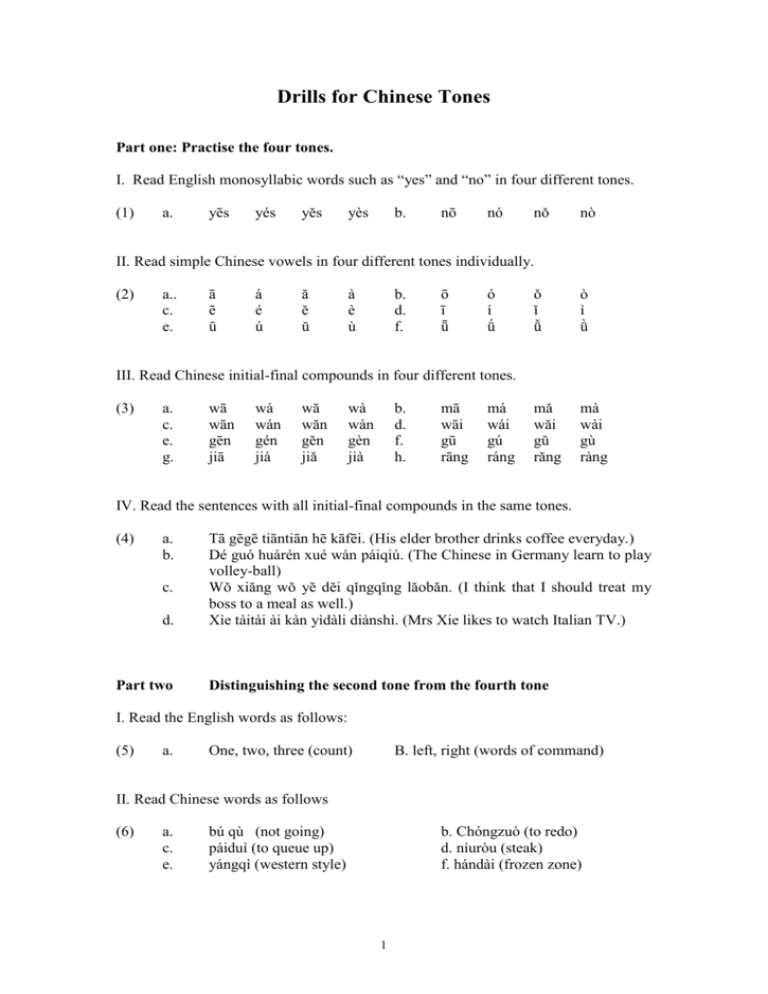
Drills for Chinese Tones Part one: Practise the four tones. I. Read English monosyllabic words such as “yes” and “no” in four different tones. (1) a. yēs yés yĕs yès b. nō nó nǒ nò II. Read simple Chinese vowels in four different tones individually. (2) a.. c. e. ā ē ū á é ú ă ĕ ŭ à è ù b. d. f. ō ī ǖ ó í ǘ ǒ ǐ ǚ ò ì ǜ mă wăi gŭ răng mà wài gù ràng III. Read Chinese initial-final compounds in four different tones. (3) a. c. e. g. wā wān gēn jiā wá wán gén jiá wă wăn gĕn jiă wà wàn gèn jià b. d. f. h. mā wāi gū rāng má wái gú ráng IV. Read the sentences with all initial-final compounds in the same tones. (4) a. b. c. d. Part two Tā gēgē tiāntiān hē kāfēi. (His elder brother drinks coffee everyday.) Dé guó huárén xué wán páiqiú. (The Chinese in Germany learn to play volley-ball) Wǒ xiăng wǒ yĕ dĕi qǐngqǐng lăobăn. (I think that I should treat my boss to a meal as well.) Xìe tàitài ài kàn yìdàli diànshì. (Mrs Xie likes to watch Italian TV.) Distinguishing the second tone from the fourth tone I. Read the English words as follows: (5) a. One, two, three (count) B. left, right (words of command) II. Read Chinese words as follows (6) a. c. e. bú qù (not going) páiduì (to queue up) yángqì (western style) b. Chóngzuò (to redo) d. níuròu (steak) f. hándài (frozen zone) 1 Part three Tone sandi I. Read these Chinese bi-syllable words both in the third tone. (7) a. c. e. g. i. k. m. suǒyĭ (therefore) chănpĭn (products) wăngwăng (frequently) běnlĭng (ability) shŭiguǒ (fruits) shǒubiăo (watch) hăoshǒu (skilful) b. d. f. h. j. l. n yĭngxiăng ( to influence) jiănshăo (to reduce) kěyĭ (can) yǒuhăo (friendly) lǔguăn (hotel) měihăo (wonderful) měimăn (perfectly satisfactory) II. Read the Chinese bi-syllable words in the third tone with another tone apart from the third tone. 3rd+1st (8) a. c. e. lăoshī (teacher) jiăndān (simple) guănwān (to turn) b. d. f. chănshēng (to produce) qǐchū (at first) gănshāng (sorrowful) 3rd+2nd (9) a. c. e. kěnéng (possibly) jĭuhú (wine pot) hăorén (good man) b. d. f. zǔguó (fatherland) gănqíng (feeling) gănyú (dare to) 3rd+4th (10) a. c. e. yĭhòu (afterwards) zěnyàng (how) xiăngxiàng (to imagine) b. d. f. kěshì (however) wăngshì (the past event) měimiào (splendid) Part four read the following words or phrases containing ‘yi’ 一 (one)and ‘bu’ 不 (not) (11) (12) (13) (14) (15) a. d. a. d. a. c. a. b. a. c. búhuì (not able to), b. búqù (not go) c.búyòng (not in use) búbiàn (inconvenient) e. búdàn (not only) f. búcuò (correct) bùjiǔ (not long) b. bùhăo (not good) c. bùlái (not come) bùmáng (not busy) e. bùtīng (not listen) f. bùxíng (not good) wànyī (in case) b. shífēn zhī yī (one tenth) shǐzhōng rú yī (consistent) d. biăolǐ rú yī (think & act in the same way) yíhuìir (a little while) b. yíkuàir (at the same place) yílù (all the way) d. yímiàn (one aspect) yíxīe (some) b. yíjiāzi(one family) yídiănr (a little) d. yítóng (together) 2 Part five Read the following passage. Wǒ jiào jiékè. Wǒ shì Yīngguó rén. Wǒ jiā yí gòng yǒu liù ge rén: bàba, mā, jiĕjie, mèimei, dìdi hé wǒ. Wǒ de bàba shì yīsheng, wǒ de māma yě shì yīshēng. Wǒ de jiĕjie èrshí qī suì, shì xiăoxué lăoshi. Wǒ de mèimei hé dìdi dōu shì zhōngxuéshēng. Wǒ shì dàxuéshēng. Xiànzài wǒ shì Běijīng dàxué de liúxuéshēng. (My name is Jack. I am from the UK. There are altogether six people in my family: my father, my mother, my elder sister, my younger sister, my younger brother and me. My father is a doctor, and my mother is a doctor too. My elder sister is twenty-seven years old, and she is a teacher in a primary school. My younger sister and younger brother are both students in a middle school. I am a student at university. At present I am a foreign student at the University of Beijing.) 3
